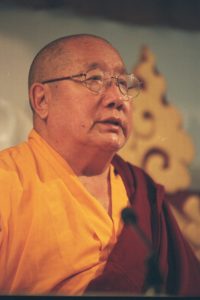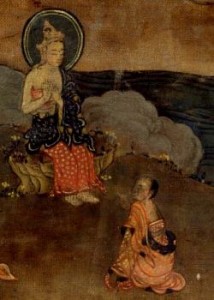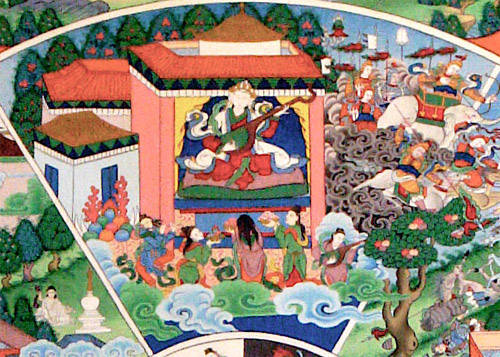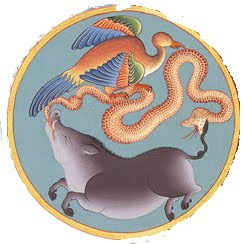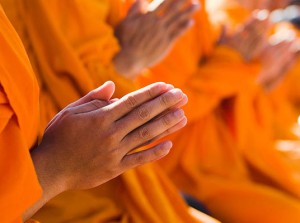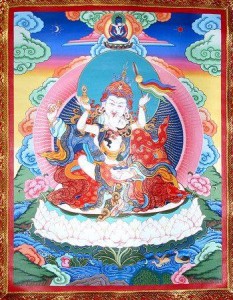
The following is respectfully quoted from “The Lives and Liberation of Princess Mandarava” translated by Lama Chonam and Sangye Khandro:
Then, just as teh vajra master was extremely pleased with the progress of the teachings being given to the princess and her retinue, and ominous sign occurred. A very unsavory, antagonistic cowherd caught sight of them while they were in a state of complete joy, receiving teachings from Guru Padmasambhava and celebrating the occasion. While the cowherd was returning home he heard many of the villagers praising Princess Mandarava and her female followers. Then he began gossiping slanderously about what he had witnessed, which of course gave rise to more gossip. The rumor spread, eventually reaching the ears of the outer ministers of the king’s palace. Then it passed to the inner ministers who, in turn, mentioned it to the queen. The youngest queen then went to the king and said, “Your daughter Mandarava is now living with an ordinary laymen with a shaved head.”
Upon hearing this, the king became very angry and scolded the younger queen for her slanderous words: “What you have said is idiotic and crazy. Your mouth is like a storehouse of negativity. A woman like you, who yearns to whisper such deceitful rhetoric, is nothing less than a demoness. My daughter, Princess Mandarava, was ordained in the presence of the great abbot. She had no attachment to any of the kings who came for her hand from every direction. It is impossible that she would care to stay in the company of an ordinary man. This talk is incredible! Even if it were a consideration, it is physically impossible because she lives in the center of a five-winged enclosure with five rings of five hundred attendants residing there. Who could pass by them without being noticed? Even if one of them kept such an intrusion a secret, surely not all of the many attendants would be able to remain silent! I demand to know who started this rumor! See to it that this person is brought to me!”
The queen returned to the seven inner ministers. They went to the outer ministers from whom they had heard the rumor. In vain they sought the source of this vicious slander. The principle ministers then returned to the king, unable to fulfill his wish. The king was furious. He reprimanded them and cautioned them to keep their thoughts silent in the future. Reminding them that many important people had great desire for the princess and that the kings of the surrounding directions would become upset, he them them all behind bars.
Gathering together much wealth, he ordered all the people of the kingdom of Zahor to congregate. Then, in the presence of all the subjects, he made the following announcement: “Kye ho! Inhabitants of the kingdom of Zahor, listen closely! Princess Mandarava has abandoned ordinary life to pursue the path of Dharma. It has been said that she is staying with a young monk. Whoever claims to have witnessed this should come forward, and this bounty of gathered wealth will be his or her reward.” Despite this amazing offer, not a single person came forward to claim the reward. News of this public announcement spread far and wide. The kings of the surrounding countries sent spies to find out if this was true, each inquiring as to the whereabouts of the princess. Unable to discover anything unusual, they eventually returned to their own countries.
Then the wives of the imprisoned men went to the cowherd and offered him a great deal of money to speak up. Offering to tend his herd, they encouraged him to tell the king immediately that he was the one who had seen the young man with the princess. The cowherd set out for town. Along the way, he encountered nine unpleasant signs. Upon arriving in the marketplace, he loudly addressed the townsfolk, “Kye! Listen to me, all you citizens of the kingdom! I am the one who will receive the reward offered by our king! I am the one who saw Mandarava in the company of a young man. You may check and see for yourselves if my words are true or false.” With that, he collected his reward and returned home to his herd.
Hearing the news, the king ordered his ministers to go to Mandarava’s palace and investigate. The queen, however, insisted that she should go instead — and so it was decided. When the queen arrived, she was refused entrance and fainted on the spot. News of this was then taken to the king. Outraged, he ordered that the queen return to him and that they break down the door to Mandarava’s quarters and bring the man in her presence to him immediately.
The ministers complied, yet when they entered the inner chambers, much to their amazement, they saw a magnificent young man seated upon a jeweled throne. His body was the very picture of dignity, blazing with luminous light. Princess Mandarava and her assembly were all seated on the floor before him, their palms pressed together in reverence as they carefully absorbed every word. Unable to accomplish the king’s command, the ministers returned to report what they had seen: “Kye ma! The bhikshu man in the company of the princess and her assembly is not of the ranks of ordinary men! Either he is a son of the god of wealth or the son of the god Brahma, the king of the gods. Otherwise, he must be a buddha who has emanated into the world of human beings. When we saw that he was the spiritual teacher of the princess, we were unable to disturb them. It is important to examine him carefully before reacting. It is possible that if a mistake is made concerning his being, irreversible negative karma may be accrued. Such an accumulation could be difficult to purify or confess.”
Hearing their words, the king was outraged. He jumped up unexpectedly from his throne. “You ministers are willing to break the law that I have enforced! Any ordinary man who would dishonor my daughter like this must be punished accordingly. Seize this lowly vagabond, bind him, and burn him alive in a pyre of tala wood. As for Mandarava, she refused to go into a family of honor according to my wishes, and now she stays with a common vagrant. Throw her into a pit of thorns, where she shall remain for twenty-five human years without seeing the light of day. Place her two main attendants in darkness and the remaining five hundred servants in confinement! Make certain that they never even hear the sound of a male voice.” After this command, the ministers who had been put behind bars were released.
News of all this spread to the bordering countries. They were angry that the king of Zahor had deceived them and began to prepare their armies for battle. Princess Mandarava and her two main attendants were captured and punished according to the king’s command. The princess was so distraught over what the ministers were doing to the precious guru that she shamed them in front of all her servants: “Are you not afraid of such intensely negative karmic accumulations, which cause unlimited rebirths in the lowest hell realms?” But there was nothing that they could do.
Meanwhile, the vajra master displayed his enlightened miraculous pwoers. Numerous deities appeared in space, and rain showers suddenly fell. The pyre became like a lake of sesame oil. In its center bloomed a marvelous, huge lotus flower surrounded by rainbows and lofty, massing clouds. The king, ministers, and all the people in the kingdom could clearly hear auspicious words and songs resounding throughout space. The entire lake and its flower were now surrounded by a ring of fire. Seated on the very center of the lotus was the Vajra Guru Padmasambhava as an eight-year-old-youth, with all the marks of perfection. A normal fire would have burned out in seven days, leaving no trace of smoke. But what a display of fire remained! The air was filled with rainbows, the sound of instruments, and the scent of pure incense.
Everyone then knew beyond a trace of doubt that this young man was indeed a nirmanakaya buddha. The king met with all his ministers. Then he sent the head minister Choden to the scene, where this minister astonishingly beheld the transformed fire and the magnificent lake with its lotus in full bloom. Upon it sat the great vajra master, whose amazing, sublime appearance was like Buddha Amitabha. Surrounding him were five maidens, each as beautiful as Mandarava, holding the five offerings. Imbued with profound faith, the minister ran back to report all of this to the king.
The king went immediately with his entourage to see for himself. Wherever he gazed in the four directions, all he could see was clear light. His astonishment left him speechless. At that moment, the amazing youth, Padmasambhava, spoke to him: “Has the negative king finally come? He who attempts to burn alive the guru who is the nature of the buddhas of the three times? Has the king with tremendous attachment to the deceptions of this world, who imposes laws that are based on meaningless delusion, finally arrived? Has the king with the greatest sense of inflated pride, who wages war on his innocent daughter, finally joined us? The root of the five passions is ignorance. Has the negative king who lacks recognition now and in the future finally come? Has the king with the intention to deceive sentient beings, the king of non-virtue — the evil king and his minister of non-virtue — finally come?”
After the guru had thus spoken, the king was so distraught with remorse that he fell to the ground unconscious. Then, coming to his senses, he lamented: “How could I have thought of accumulating such negative karma as this? Although my daughter has found a living buddha, I perceived with such wrong view! Oh, how could I think to be so negative? Kye ma! Kye hu!” He cried in despair and began pulling his hair out, scratching and marring his face while rolling and thrashing on the ground in an emotional uproar.
The principle ministers were filled with remorse and began proclaiming their deep regret. In their duress, they supplicated their leader, the king: “Listen, great king, lord of men! Although we cautioned you to examine this young man more closely, it was to no avail. Now you must offer confession, offerings, and supplication prayers.” This time, the king took their advice to heart. The people of Zahor were asked to assemble, regardless of race, class, age or creed. Countless in number they arrived to bear witness. The king stood up among them and began offering many full-length prostrations to Guru Padmasambhava. With the sound of strong remorse in his trembling voice, he offered this supplication prayer:
“Kye ma! O buddha of the three times, please listen to me! The remorse I now feel in my heart is unbearable. When I attempt to burn one such as you in the hottest of fires, you transformed the flames into a lake of sesame oil. Then, in the center of this magnificent lake, you appeared in full glory, seated upon the stamen of a lotus flower in full bloom. O faultlessly pure one, master of transformation, I prostrate and render praise to you, the self-originating immortal Padmasambhava! I openly confess with deep remorse and regret any harm I have brought upon your sacred, enlightened body, and I beg your forbearance for my misdeeds! I humbly offer you my kingdom, and I pray you will accept it now. I, King Indra Viharadhara, will remain as your follower, and I pray that you will dispel the ignorance in the minds of beings! Please come now to take your seat in the palace.”
As the king made this offering and request, everyone present could see the gods, nagas, dakinis, emanations of the guru, and the buddhas within the massing clouds and rainbows. Then the lovely sound of a fine vina could be heard, accompanying the verses of praise: “Hrih! Praise to the body of the great Padmasambhava, unattached and untainted by impurity!” Many such verses of praise could be clearly heard. Then everything dissolved into space, and the people of the kingdom were overcome with devotion and faith.
The great vajra master himself spoke again: “E ma ho! O great king and your hosts of subjects, please pay heed! I am the nature of the buddhas of the three times! Unstained by the womb, I have self-originated from a lotus. My background is like the nature of space, unaffected by happiness or displeasure. My body, stainless in nature, cannot be harmed by elements of fire. The workings of positive and negative karmic accumulations do not affect me in the slightest, but sentient beings will surely make mistakes because of confused perception. Your noble qualities, O king, are like the greatest of mountains, Mount Meru. All of this has occurred in order to guide you to the path of the Buddha. O king, do not despair; I accept your offer. Now I shall go to the palace as you have requested.”
The king was overwhelmed with joy. He ordered all the ministers to depart at once for the palace and to bring his newest and finest brocade silk cloak, articles of clothing, and crown. He also ordered that they return with seven of the finest carriages, adorned with various flags and victory banners. They quickly departed to accomplish his wishes. When they returned, a silk brocade throne was prepared on the most splendid carriage, and the vajra master took his seat, surrounded by silken flags and banners of victory and good fortune. The king then offered each of his royal articles of brocade clothing to the master, who carefully put on each one. He also donned the crown and boots of the king. Then the king himself hung the yoke of the carriage around his own neck and, replacing the horses, began pulling the carriage to the palace. This was witnessed by all the people of the kingdom, who surrounded the carriage in a great parade, offering unceasing prostrations and prayers with fervent faith and devotion. Upon arriving at the palace, the great vajra master entered the inner chambers and took his seat upon the throne of seven precious jewels.
Then the king asked that Princess Mandarava be brought to him. When the ministers went to open the pit into which she had been thrown, they told her of the miracles that the great vajra master had performed. Showing her the king’s golden parchment letter requesting her to come to the palace, they begged her over and over to respond. She remained silent.
When the ministers returned without success, the king then told the queen to go and convince Mandarava to come and join them. The queen gathered the silken garments of the princess, hoping that she would wear them and return. When she met her daughter and begged her to reconsider, Mandarava replied: “No matter what happens, I intend to remain here for the duration of twenty-five human years. I shall never disobey the command of my father the king. However, you and my father have only one daughter like me. How could you do what you did to my guru, who is the actual buddha of the three times?” Mandarava then broke down in tears and fell into the arms of her mother. They both wept uncontrollably.
In a short time, all the women in the country of Zahor began to weep, and the king feared that the princess had passed away. He rushed to the pit. To his relief, he found her still alive, and he begged her to return to the palace to see for herself what had transpired. Breaking down in tears, he said, “O daughter, I never intended to create such an obstacles to your Dharma. This father of yours feels deep regret for what he has done. Thinking myself so high, I have now fallen so low. My meaningless behavior has brought you such grief. Please forgive me.” Then he took her hands and kissed her, and her mother caressed her.
As she consented to join them and return to the palace, both the king and queen were crying. Mandarava was reunited with the vajra master, to whom she prostrated as he wiped away her tears. She praised him with this song of heartfelt devotion:
“You, the enlightened one, came to this continent of nonvirtue. Fearlessly powerful, you came with neither expectation nor apprehension. Embodiment of miraculous enlightened activities, may there be the good fortune of the unceasing radiance of your enlightened display! Born from the lotus, your body is a radiant hue of white and red. You are adorned with the sublime marks of excellence, and your thirty-two major marks are resplendent to behold. The noble qualities of the lotus-born buddha of the three times are beyond the limits of the mind. With faith I bow down to you, the embodiment who is one with the buddhas of the three times. As the embodiment of rapture with major and minor marks, your form is as great and perfectly proportioned as Mount Meru. Shaped like the king of all mountains, you have a head round as a vase; your hair is lovely as the blooming udumbara flower. Your nose is perfectly proportioned; your upper and lower lips are like the petals of a lotus flower. Your tongue is long, thick, and red like a lotus. Your array of fifty-eight teeth glow white, like a range of snow mountains. Your face is peaceful. Your neck and chin are endowed with the richness of youth. The sound of your voice is as resplendent as the kalapanga bird. Your black mustache and beard are like the fur of a magnificent black bear. Your coloring is like a white conch shell that has been delicately painted with vermillion. Your perfect neck is shaped like a lovely vase. Praise to your presence! You are like a grand snow lion poised in full glory. Your shoulders are broad and arched in perfect proportion. Your toes and fingers are long and webbed. Your nails are the color of copper-red crystal, your navel attractive, like the stem of the lotus. Your male organ is drawn in and contracted, completely concealed like that of an elephant or horse. Your calves are like the legs of a deer, and your lotus feet are rich and fleshy. You pass through space in the flash of an instant, like a rainbow. Your ever-youthful presence supports limbs that are full and strong. When you smile, you are so attractive that not a fault can be found. Your presence is so pleasing that one cannot gaze upon you enough. your radiance blazes like an orb of light. To touch your skin brings unique vajra-bliss to everyone. You, Padmaasambhava, are the one who displays these marks of sublime excellence. Praise to the body of the buddhas that displays the thirty-two major marks.” Thus she offered prostrations and rendered praise with great devotion.
The vajra master was very pleased, and he offered the princess this response: “E ma! Your present relatives cannot be called loving relatives. The truly loving relative is the precious spiritual guide who leads one upon the true path, revealing the virtuous path and causing one to turn from the harmful path. Your present blood relatives are now objects of compassion and mercy, and ordinary relatives will only encourage you to pursue that which is other than the spiritual path. Count the many examples of this, and you will clearly see that this is indeed the cycle of existence.
“Unable to satisfy their endless needs and desires, beings suffer unceasingly. This is not the meaning of wealth and endowment at all. What you have finally found is the treasure of true wealth. The seven-fold wealth of the aryas is wealth that cannot be found externally. Except for that, all other attempts to acquire and maintain ordinary wealth are the cause of suffering. That which we call wealth is not found in existence or quiescence — it is instead your indwelling precious buddha nature. This is not widely recognized, and not recognizing it causes it to be wasted. Even if it is recognized, it is wasted if it is not sustained. The time has come to understand that negative circumstances can be transformed into spiritual power and attainment, and to make use of this truth. Utilize adversities and obstacles as the path!” Just by hearing these words, Princess Mandarava was naturally liberated.
King Viharadhara then offered to his daughter the flesh of a holy man, a wish-fulfilling jewel, and the wealth of the kingdom without exception. he supplicated the guru to transmit his noble qualities to him until the end of his life. He requested the vajra master to stay in the land of Zahor until all the people were led to fruition. For the next three years the vajra master turned the wheel of the vast ocean of the Buddha’s teachings.
When the kings of all directions heard the news that Mandarava had been offered to the vajra master, they felt deceived and angrily prepared their armies for war, aggressively advancing on the kingdom of Zahor from the four directions. The general Mahabala entered Zahor through a narrow ravine and captured some small villages. The vajra master intervened, using his miraculous powers against the enemies. In particular, he released the mandalas of the eight herukas, turning the aggressors back so that they all returned to their countries.
The vajra master gathered together the three hundred and sixty ministers of the king, the five queens, the five hundred servants of Mandarava, and one hundred and eight monks in his assembly, and turned the Dharma wheel for them. He taught the eight volumes on the sacred utterance and guardians, the five tantras on the condensed utterance of the Great Perfection, four volumes on the Heart Essence doctrine, five other titles, twenty tantras, and forty-two volumes of esoteric instructions.
Each and every one of his disciples was brought to fruition, and twelve becamemahasiddhas. All were established irreversibly on the spiritual path. The doctrine of Avalokiteshvara spread throughout the land of Zahor, and all its inhabitants were brought to fruition. The king eliminated all heretics from the kingdom, and his heir, the Vajra Guru Padmasambhava, took his seat on the throne to govern the entire kingdom thereafter.
Samaya
